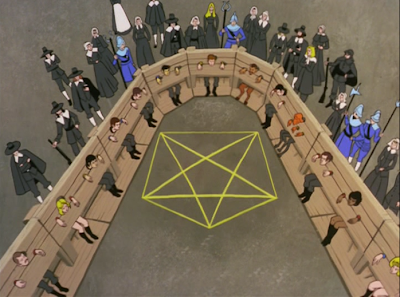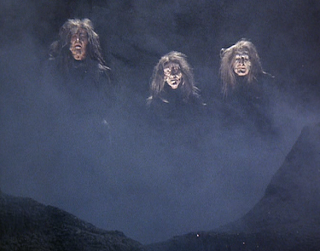On October 6th, 1966, a day that
lives in infamy for Merry Pranksters everywhere, Captain Kirk (and through him,
America) confronted:

Title (2.5) If I taught a college course on Trek, it would be fun to spend a few weeks on this episode, with each class organized around a different reading. "The Enemy Within" is an invaluable object of meditation that rewards the field researcher with varied interpretations, all more or less equally credible thanks to the story's broad accessibility. We've seen this before, of course; the only show to achieve more success than
TOS in this multiple-meaning arena is
The Prisoner (arguably) and it had to abandon linear narrative altogether to surpass it.
I'd start off said class with the assignment to read the goings-on as a breakdown of Shatner's Narcissistic Personality
Disorder, simply because it's incredibly amusing to do so. Try it on your next watch. Google your preferred definition (or set of definitions,) hit play, and have a blast.


But we’ll stick with the reading closest to the surface: that of the Id, Ego, and Superego. A common enough issue of the era, to be sure, and of no small interest to the Genes.
These are probably familiar terms to you, but should a quick refresher be of use to you, click
here. I'll get into this more below, but I mention it here because "The Enemy Within" works pretty well as a catch-all title, but given the tertiary nature of the concept, the title should perhaps be plural. "The Enemies Within" would have been confusing, though. It's a very minor red flag but enough for me to dock half-a-point.
Script and Theme (7 / 10) Okay, so Id, Ego, Supergo. This is already written into the show via its holy trinity (Bones,
Kirk, and Spock) but here their shared dynamic is explicitly sub-divided (if you will) via a split Captain Kirk. "Two of the same animal but different.
 |
| "One gentle, this. One mean and fierce, that: |
 |
| "Some kind of savage, ferocious opposite." |
The genius of the Genes was taking original material

and re-shaping it into this sort of prism of simultaneous meaning described above. They weren't 100% successful all the time ("Mudd's Women") and alienated some of the writers whose scripts they worked over in this manner ("City on the Edge of Forever.") But when they were on, they were on. The source material might have its own implications or subtext, but what the Genes did was harness it towards their own preoccupations and their Trek-occupations, if that makes any sense. I'll trust you know what I'm getting at well enough by now: TOS is the warp-nine intersection of all these various factors. Or as Freud put it: Underneath the surface, our
personalities represent the power struggles going on deep within us. True for Western civilization, true for 1960s television.

The Captain's ego ("good") is paralyzed upon discovery that his Id ("bad") has taken on a life of its own and roams the decks of the
Enterprise:
He's so distraught he can't even bring himself to use traditional sentence structure in his as-it's-happening report to Starfleet:
Captain's Log, stardate 1673.5. Transporter... still inoperable. Negative self is under restraint in Sickbay.
My own indecisiveness... growing. Force of will... steadily weakening. On the planet, condition critical. Surface temperature is 75 degrees below zero... still dropping.
Spock's role in the proceedings (as he helpfully summarizes about halfway through the episode) is to play the supergo, to help re-fuse Kirk's Id and Ego back into a functioning whole. He is ideally suited to perform this task, as he tells Dr. McCoy:
Being split in two halves is no theory with me, Doctor. (...) I survive it because my intelligence wins over both, making them live together.
 |
| “As if the ego's job wasn't hard
enough, playing referee between the id and reality, its performance is under
constant scrutiny by a relentless judge, the superego. While the ego negotiates
with the id, trying to prevent another tantrum, the superego judges the
performance. (Superego) expects
your ego to be strong and effective in its struggles against the libido's
force.” |
Among the Superego's duties is to goad the ego into action by appealing to its vanity, as Spock certainly does:
You're the Captain of this ship. You haven't the right to be vulnerable in the eyes of the crew. You can't afford the luxury of being anything less than perfect.
When it comes to the imaginary integrity of the space navy and the men (and women) who hold command positions within it, that kind of dialogue is
so much more palatable in service of pop-psychological pastiche such as this than for its own sake as an attempt to generate tension or drama. It's part of the reason I have trouble with episodes like "The Doomsday Machine." As cool as the planet-killer-
bugle in space is, all the Starfleet captain bravado really grates on me. To each his own, of course.
Another psychological phenomenon on display here is
splitting, i.e. “the failure in a person's thinking to bring together both positive and
negative qualities of the self and others into a cohesive, realistic whole.” This leads to idealization
and devaluation. (And is essential to understanding modern media techniques of manipulation, but that's a story for another day.)
 |
| Let's stick with Splitting. |
 |
| "I'm the Captain. Isn't that obvious?" |
  |
| "Look at his face." |
 |
| "Look how he's tried to hide them." |
 |
| "You know who I am." |
As encouraged by Spock and Bones, the Id and the Ego realize the destruction of one means the destruction
of the other and slowly reconcile and re-fuse.
  |
| As every TOS fan could tell you, he wanna live! |
I originally went with scores of 10 apiece for this category, but I'm deducting 3 points from the script for the end, where Spock tells Yeoman Rand that the Captain's Id had some... "interesting qualities, wouldn't you say, Yeoman?"
He's clearly suggesting that the Yeoman (and by extension all women) are secretly turned on by their rapists. (Oh yeah, I guess I should have mentioned that: once out from under the thumb of his ego's rules and restrictions, the Captain's Id hastens to Yeoman Rand's quarters and urges her to STOP PRETENDING, JANICE.)
 |
| Like Chekov's attempted sexual assault in "Day of the Dove," the horror of it all is somewhat undermined by the actors' hammy (though perfect) delivery. You don't die... not yet for "Dove," and the Too Much Woman matter-of-factness, here. |
As Grace Lee Whitney wrote in her
memoir:
I
can't imagine any more cruel and insensitive comment a man (or Vulcan)
could make to a woman who has just been through a sexual assault! But
then, some men really do think that women want to be raped." All the more chastising given Whitney's real-life sexual assault(s) on the show. (Also: that Shatner slapped her, repeatedly, admittedly with her permission, to get her "into character" for this scene.)
Add it all up, and it's a big bowl of discomfort for your humble narrator, and, I imagine, more than a few other people. That the script "goes there" is good; the Freudian catacombs are indeed filled with Cthulhian horrors, well worth mapping out. It'd probably be a cheat without it. That Spock wraps this episode up with this obscene bow? Less good. Substantially. Like double-plus-un-good, times infinity.
Come to think of it, it's always Spock who gets these sorts of lines, isn't it? I think we're meant to believe Spock is a little sexist, because he's all about logic and
women (makes whirly-finger gesture at ear) amirite? I prefer to look at that as the sexism of the era and not deliberate
characterization of Mister Spock. It's certainly an aspect of the character that Nimoy never revisited after the 60s.
Anyway, I should probably deduct even more than 3 points for such an incredibly tasteless thing, but of course no addition or deduction on my part does much of anything. Who knows what the hell they were thinking or trying to get across, but if it isn't what it seems (i.e.
You know you wanted it) they really dropped the ball in conveying it.
Visual Design (1.5) I guess it's the first time we ever see Engineering, so that's something, but it's not one of the more visually exciting episodes. Plenty of close-ups that emphasize the Captain's eye shadow, to be sure:
Kirk and the Gang (35)
 |
| Not the most coveted part ever offered an actress, but Whitney does a good job here. |
 |
"C-captain K-k-kirk..." |
Guest (2.5)
 |
| As Eugene Myers writes: "The poor dog in that furry costume was very silly, but I was amused that
almost every cast member cradled it at some point with a straight
expression." |
Internal Logistics (1.5) One of the earlier episodes so still plenty of stuff coming together. Mr. Farrand makes a good point, though, re: Spock's line about his human half as well as an alien half, submerged: "Did he just call his Vulcan half "alien?" I thought Spock prided himself on his Vulcan heritage. Wouldn't he be more likely to identify his human half as alien?"
- Also, we saw Deela admiring the Captain's grooming products in "Wink of an Eye." Here we see he has stage make-up at hand, too - amazing! I bet he keeps that stuff around just for the ladies. Straight out of the Playboy Guide.
Memorability (5) #TrekConfessions: In the late 1990s, I attended a
poetry reading in Dayton, OH and was asked to participate. Everyone may
have been a little out of their minds on Saurian Brandy, among other
things. I approached the microphone with a bit of trepidation, which was
just for dramatic effect; I was actually quite composed as I knew
exactly what I had to say and how to say it. "(Pause)
Get those men beamed back aboard fast."
* Mic drop, arms raised, exit stage left.
In
my imagination, this brought down the house down, a calculated,
Kaufman-esque send-up of the whole experience. In reality, the lone
chuckle of my buddy Mike was all I heard against an awkward backdrop of chairs scraping against the floor, murmurs, and glasses clinking behind the bar.
* The actual line is Get those men aboard fast, but that's how I said it. (If someone had shouted that out from the audience, correcting me, that would have made it way cooler. I'm tempted to add that detail - I mean who would know?)
Total Points Awarded: 65




















































































